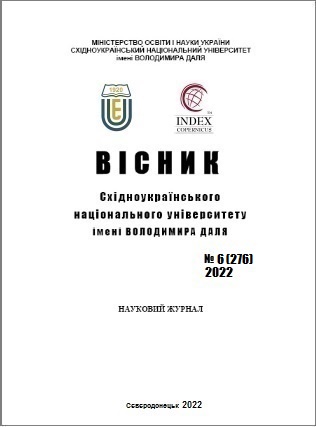Tax awareness of the society as a driving factor in the development of e-democracy
DOI:
https://doi.org/10.33216/1998-7927-2022-276-6-26-30Keywords:
e-democracy, e-government, taxes, budget, digitalizationAbstract
The article examines the directions of development of e-democracy and e-government in Ukraine, sharpens the issue of the development of tax awareness and tax culture in society. The relationship between tax awareness and the use of electronic technologies to support democratic processes in society, which in turn depends on the presence of a trained and knowledgeable population, has been studied. An analysis of scientific research and existing statistical data confirming the importance of tax awareness in the development of electronic democracy was carried out. The theoretical aspects of tax awareness and electronic democracy are considered, and practical examples of the use of electronic technologies in democratic processes in Ukraine are also analyzed. The research used such methods as: going from the abstract to the concrete, formalization, idealization, modeling, analysis, synthesis, induction, description, observation, experiment. An analysis of approaches to increasing the level of tax awareness in society, in particular, with the help of modern information technologies.the question helps to increase the level of awareness and knowledge about electronic technologies and their use. The significance of the analysis of electronic democracy as a phenomenon of modern society and its role in the democratic process is highlighted. Modern trends in the use of electronic technologies in public administration and democratic processes are described. Ways to increase tax awareness and culture of the population through the modernization of the «Diya» mobile application have been identified. The introduction of measures to increase tax awareness and the terms of their implementation are proposed. Recommendations are given on increasing the level of tax awareness in society and the use of electronic technologies to support democratic processes. The practical work of the proposed measures was demonstrated, their strengths and weaknesses were identified, and additional measures that could be implemented were indicated. The results of the study prove the importance of tax awareness in creating favorable conditions for the development of electronic democracy and provide recommendations for increasing the level of public awareness in this matter.
References
1. Видюк М.В. Розвиток електронного самоврядування в Україні. Кращі практики децентралізації: досвід країн ЄС для України : матер. науково-практичного круглого столу (Суми, 27 травня 2022 р.). Суми : Сумський державний університет, 2022. С. 8.
2. Гедікова Н.П. Демократія та електронна демократія: сутність, стан, перспективи розвитку. Політикус : наук. журнал. 2021. № 3. С. 37–42.
3. Греца С.М. Роль податкових органів у забезпеченні виконання обов’язку по сплаті податку на додану вар-тість.Актуальні завдання та напрями розвитку юри-дичної науки у ХХІ столітті : Матер. Міжнар. науково-практ. Конф. (15-16 жовтня 2021 р.). Львів, 2021. С.73-77.
4. Гусєва О.Ю. Легомінова С.В. Діджиталізація – як ін-струмент удосконалення бізнес-процесів, їх оптиміза-ція. Економіка. Менеджмент. Бізнес. 2018. №1. С. 33-39.
5. Іващенко О., Боярчук Д., Шульга Є. Про громадян України як платників податків у соціологічному вимірі. Соціологія: теорія, методи, маркетинг. 2021. №2. С. 156-180
6. Краснокутська Л. Електронна демократія в Україні та перспективи розвитку. Молодь, наука, бізнес : матеріа-ли Всеукр. інтер.-конф. здоб.вищ.освіти і мол.учених, 5-6 жовтня 2022 р., м. Миколаїв. Миколаїв : МНАУ, 2022. С. 164-168.
7. Mihrovska M.S. Digital democracy in Ukraine: current state and development prospects. Scientific Collection «In-terConf» : with the Proceedings of the 4th International Scientific and Practical Conference «Global and Regional Aspects of Sustainable Development» (July 6-8, 2021) Copenhagen, Denmark; 2021. №65. pp. 21-27
8. Натрошвілі С.Г. Шацька. З.Я. Smart-технології, як ос-нова розвитку smart-економіки. Імперативи економіч-ного зростання в контексті реалізації глобальних ці-лей сталого розвитку : тези доповідей III Міжнародної науково-практичної Інтернет-конференції, м. Київ, 10 червня 2022 року. В 2-х т. Т. 1. Київ : КНУТД, 2022. С. 185-187.
9. Орловська Ю., Ларіонова К.. Сучасні умови впрова-дження електронної демократії у вітчизняне публічне управління: регіональний аспект. Економічний простір. 2021. №171. С. 52-57.
10. Руднєва А., Мальована Ю. Імідж України в умовах су-часних інформаційний процесів: цифрової трансфор-мації та становлення електронного урядування. Вісник Львівського університету. Серія філос.-політолог. студії. 2022. Випуск 42. С. 320–327
11. Ручкіна В.Н. Формування податкової культури в Укра-їні та аналіз її складових частин. Економіка промисло-вості. 2013. № 1-2 (61-62). С. 194-200.
12. Сушкова О., Мельник О. Систематизація наукових пі-дходів до визначення сутності та змісту поняття «По-даткова культура». Фінансові ресурси: проблеми та використання. 2021. №1 (25). С. 143-150.
13. Ткачук Н. Діджиталізація фінансово-економічної сфери в Україні : стан та перспективи розвитку. Економічний часопис Волинського національного університету імені Лесі Українки. Т.3. №31, 2022. С. 18–28.
14. Устенко М.О., Руських А.О. Діджиталізація: основа конкурентоспроможності підприємства в реаліях циф-рової економіки. Вісник економіки транспорту і про-мисловості. 2019. № 68. С. 181–192.
15. Видатки зведеного бюджету України. Мінфін. URL: https://index.minfin.com.ua/ua/finance/budget/cons/expense/2022/
16. Доходи зведеного бюджету України. Мінфін. URL: https://index.minfin.com.ua/ua/finance/budget/cons/income/2022/

